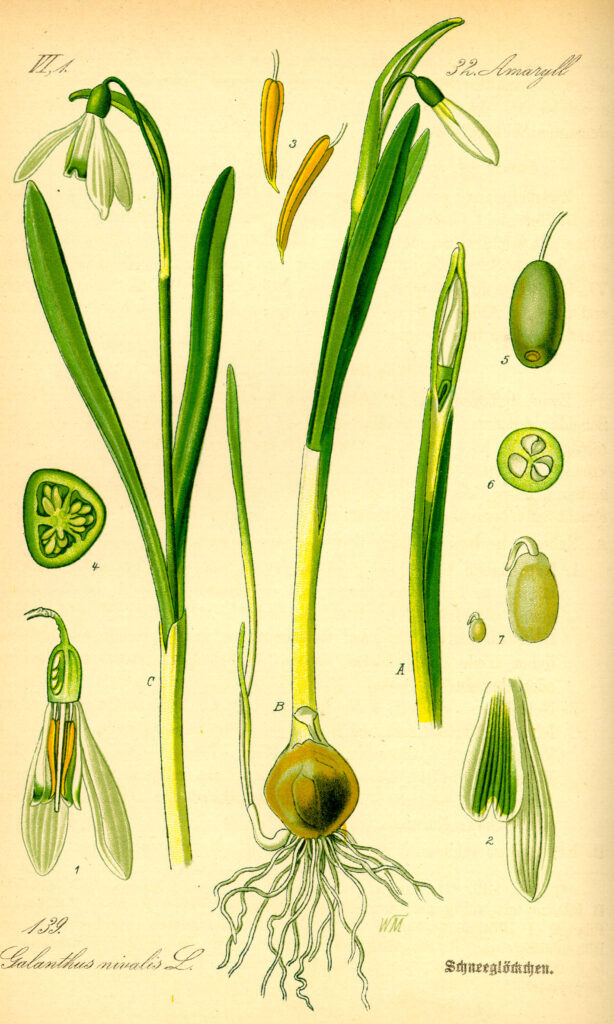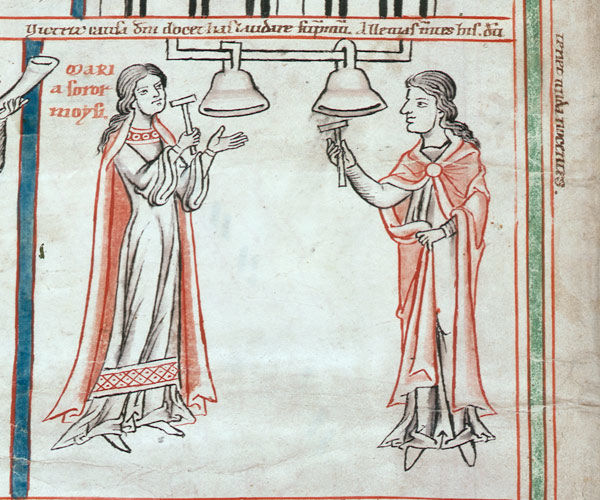From the Vienna 'Theaterzeitung' of 27th September 1828, reporting on the consecration of a new bell: "During the solemn procession [to Holy Trinity Church, Alsergrund] the following song, 'Faith, Hope and Charity', written by the Imperial and Royal Court actor, Herr Reil, and provided with a lovely melody by Herr Franz Schubert [D 954], was sung: Gott! laß die Glocke glücklich steigen, Die Töne schallen in der Luft, Daß hell sie von der Andacht zeugen, Zu der uns unser Glaube ruft! An Dich, o Schöpfer, glauben wir; Die Glockentöne hallen Dir! Von Dir tönt alles Heil hernieder. O nimm zu Deinem Lob und Ruhm Auch unsers Dankes Töne wieder Aus Deines Hauses Heiligthum! Auf Deine Gnade hoffen wir, Die Feyertöne jubeln Dir. O Gottes Friede nur frohlocke, Nur Liebe uns von diesem Thurm! Und nie bewege sich die Glocke Zum Unglück, Jammer, Brand und Sturm! Zur Liebe, Liebe läute sie, Aus Liebe nur klingt Harmonie. God, may this bell ascend with good fortune, May its notes resound in the air, So that it can bear witness to the devotion To which our faith calls us! We believe in you, oh creator, The notes of the bell reverberate for you! All salvation comes ringing to us from you. Oh, to your praise and glory, accept Also the notes of our thanks returning Out of the sanctuary of your house! We hope for your grace, These festive notes are in honour of you. Oh may the peace of God sound out joyfully With love alone out of this tower! And may the bell never be rung Because of an accident, lamentation, fire or storm! Let it ring with love, with love, Harmony is only heard as a result of love." From Otto Erich Deutsch, Schubert. A Documentary Biography London 1946 page 804
Reil’s words remind us that church bells were used for various purposes in central Europe in the early 19th century, and they were expected to be able to arouse a range of emotions ranging from elation to deep mourning. It is therefore striking that this appears to be the only poem about bells in Schubert’s oeuvre in which public bells are associated with jubilation. They are more usually connected with death.
Passing bells (Leichenglocke or Zügenglöcklein) were rung as parishioners lay dying, and the death knell sounded at the moment of death or at funerals. These mournful sounds are central in Romanze (D 114), Mailied (D 130, D 202), Der Jüngling auf dem Hügel (D 702), Die junge Nonne (D 828) and Das Zügenglöcklein (D 871). Most Catholic churches rang an Angelus bell three times a day (morning, noon and evening) as a call to prayer, and the evening bell (particularly in autumn) has inherent associations with death:
Horch! des Abendglöckleins Töne
Mahnen ernst der Erde Söhne,
Dass ihr Herz
Himmelwärts,
Sinnend ob der Heimat Schöne,
Sich des Erdentands entwöhne.
Listen! The notes of the evening bell
Are sending a powerful reminder to the sons of earth
That their hearts
Should turn heavenwards,
As they reflect on the beauty of home
And the need to break their attachment to the fripperies of earth.
Silbert, Abendbilder, D 650
Abendglocken-Halle zittern
Dumpf durch Moorgedüfte hin.
Hinter jenes Kirchhofs Gittern
Blasst des Dämmerlichts Karmin.
Aus umstürmten Lindenzweigen
Rieselt welkes Laub herab,
Und gebleichte Gräser beugen
Sich auf ihr bestimmtes Grab.
The echoes of evening bells are reverberating
But are muffled as they are carried on the moorland breezes;
Behind the fencing of that churchyard
The crimson light of sunset is turning pale.
From the branches of lime trees battered in storms
Dead leaves flutter down,
And faded leaves of grass bend down
Over her designated grave.
Salis-Seewis, Der Herbstabend, D 405
There are, though, examples of bells that lift the spirits. These tend to be cowbells, the sound of the Alps. When mountain people are stranded on the plains this is the sound they most miss (Das Heimweh, D 851). For Mayrhofer, trapped in Vienna and its bureaucracy, cowbells are the sound of freedom (Rückweg, D 476).
In some cases it is not the sound but the sight of bells that matters. This is because the German language sees some flowers as bells: lilies of the valley are Maiglocken, May bells (Hölty, Frühlingslied, D 243, D 398) and a snowdrop is a Schneeglöcklein, a little snow bell (Schober, Viola D 786).

☙
Descendant of:
SOUND MUSIC RELIGIONTexts with this theme:
- Romanze (Ein Fräulein klagt´ im finstern Turm), D 114 (Friedrich von Matthisson)
- Ammenlied, D 122 (Michael Lubi)
- Mailied (Der Schnee zerinnt), D 130, D 202 (Ludwig Christoph Heinrich Hölty)
- Auf den Tod einer Nachtigall, D 201, D 399 (Ludwig Christoph Heinrich Hölty and Johann Heinrich Voß)
- Der Liedler, D 209 (Joseph Kenner)
- Frühlingslied (Die Luft ist blau), D 243, D 398 (Ludwig Christoph Heinrich Hölty and Johann Heinrich Voß)
- Der Herbstabend, D 405 (Johann Gaudenz von Salis-Seewis)
- Rückweg, D 476 (Johann Baptist Mayrhofer)
- Der Alpenjäger, D 588 (Friedrich von Schiller)
- Abendbilder, D 650 (Johann Peter Silbert)
- Der Jüngling auf dem Hügel, D 702 (Heinrich Hüttenbrenner)
- Viola, D 786 (Franz Adolph Friedrich von Schober)
- Gondelfahrer, D 808, D 809 (Johann Baptist Mayrhofer)
- Die junge Nonne, D 828 (Jacob Nicolaus Craigher de Jachelutta)
- Das Heimweh, D 851 (Johann Ladislaus Pyrker von Felső-Eör )
- Das Zügenglöcklein, D 871 (Johann Gabriel Seidl)
- Glaube, Hoffnung und Liebe, D 954 (Friedrich Reil)


